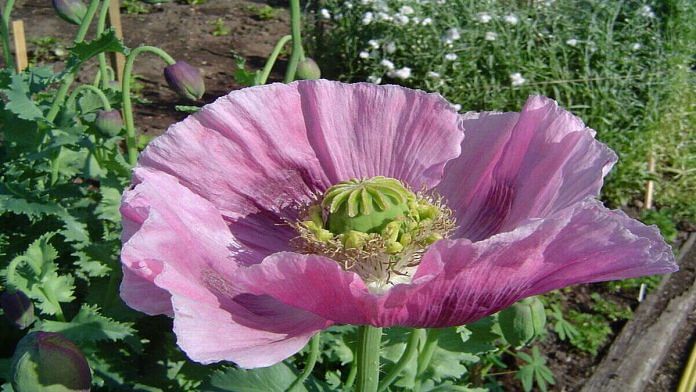New Delhi: Pharmaceutical company Bajaj Healthcare Limited has become the first private player in India to be awarded a government contract for the highly-regulated opium processing sector — a development that means the company can use opium to extract active pharmaceutical ingredients (APIs) used in medicines such as painkillers, cough syrups, and even cancer drugs.
Making the announcement through a statement Wednesday, the Thane-based Bajaj Healthcare said it had received two letters from the central government on 12 July to manufacture APIs from processing of unlanced poppy capsule (unopened poppy bulb with its stalk) as well as straw and opium gum (both used to extract alkaloids).
Anil Jain, the joint managing director of Bajaj Healthcare, said in the statement that the company had been awarded two tenders for the supply of “opium-derived alkaloids & APIs” to the central government under long-term contracts and expects “successive orders under similar tenders, to scale up to processing of 6,000 MT [metric tonnes] of poppy straw & opium gum in the next 5 years”.
“This is for the first time in the history of the nation, that the government has deregulated opiate processing to a private player and we are extremely honoured to be awarded the very first tender in this segment,” Jain said.
The company said it will execute both tenders at their API manufacturing unit in Savli, Gujarat.
“The APIs will be manufactured under highly regulated conditions and under strict adherence to protocols prescribed by the Government of India,” the statement said. “The unit is well placed to cater to all mandated quality checks and controls, with capacity enhancement capabilities.”
The contracts will be valid for a period of five years, the company added.
Although India is one of the few countries that permit opium cultivation, its processing has so far been highly centralised. In India, opium poppy cultivation is prohibited under Section 8 of Narcotic Drugs and Psychotropic Substances (NDPS) Act, 1985, except under a licence issued by the Central Bureau of Narcotics under Rule 8 of NDPS Rules, 1985.
The Central Bureau of Narcotics procures opium poppy from farmers and transfers it to the Government Opium and Alkaloid Works (GOAWs) factories at Ghazipur and Neemuch for further processing to extract alkaloids for medical use. The narcotics bureau and GOAW both come under the Ministry of Finance.
Also Read: Manipur has a ‘hill of poppies’ problem. But CM’s war on drugs must tackle land issues first
History of opium cultivation in India
The development comes less than three months after the Modi government decided to increase the existing capacity of production of alkaloids and APIs from opium gum produced in India.
In April, the Union government invited tenders from licensed companies with the capacity to process 100 MT of opium gum and 500 MT of poppy capsules along with straw annually to extract alkaloids or APIs.
The latex of the opium poppy contains up to 80 alkaloids, including morphine and codeine, which have been used for the treatment of severe pain for generations. The seeds are used as food and to produce edible oil.
While morphine is a potent painkiller, codeine is used in cough syrups and has mild pain-relieving properties.
However, alkaloids from opium are also subject to misuse. For example, morphine can be processed chemically to produce heroin, a highly addictive and illegal narcotic drug.
During the Mughal Empire, poppy was extensively grown and it was an important item of trade with China and other eastern countries.
As the Mughal Empire began to decline, however, monopoly on cultivation of poppy passed into the hands of the East India Company that had, by that time, assumed the responsibility for collection of revenue in Bengal and Bihar.
In 1773, the then Governor General of Bengal, Warren Hastings, brought the entire opium produced in Bengal, Bihar and Orissa under the control of the East India Company.
After India gained Independence, control over cultivation and manufacture of opium became the responsibility of the central government. Three central government laws — the Opium Act, 1857, the Opium Act, 1878, and the Dangerous Drugs Act, 1930 — became uniformly applicable in all the states.
Currently, powers and functions relating to superintendence of opium poppy cultivation and production are vested on the narcotics commissioner and his subordinates under the NDPS Act and its allied rules.
Additionally, the central government announces its licencing policy for cultivation of opium poppy every year, prescribing, among other things, the minimum qualifying yield for the issue or renewal of licence, maximum area that can be cultivated by an individual cultivator, and the highest compensation that a cultivator can claim for crop damage.
The opium poppy can be cultivated only in tracts notified by the central government. Currently, these tracts are confined to three states — Madhya Pradesh, Rajasthan and Uttar Pradesh.
(Edited by Uttara Ramaswamy)
Also Read: How drugs are brought into India: In weddings cards, by drones and hidden in sea cargo



